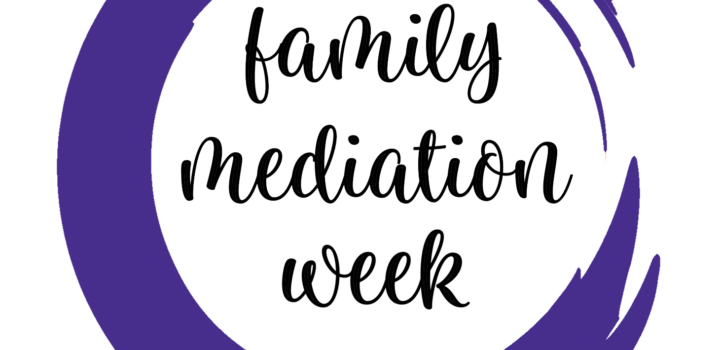

What is family mediation?
Family mediation is a voluntary process which helps you and your partner or spouse to agree on arrangements for your finances or for your children during or after separation. The role of the mediator is to meet both parties at the same time and facilitate a discussion in a neutral, compassionate and non-judgmental manner in order to support you in reaching an agreement.
The focus of family mediation is to promote and maintain a healthy dialogue so that both parties have ownership of the decisions affecting their future after they have separated. The focus is very much on the family, and the needs of both the parents and the children of the family. Where appropriate, mediation is always child-focused.
What are the benefits of family mediation?
Mediators are impartial and neutral facilitators. We do not take sides but try to create a non-confrontational atmosphere to encourage a positive dialogue between those involved.
The key to family mediation is that the decision making rests with you, the participants. You retain control of your future and your children’s futures.
Family mediation cannot be forced on either partner or spouse. This means that each individual can stop the process whenever they choose. It is also confidential unless there is a risk of harm to a child or vulnerable adult, which helps individuals to feel at ease with the process.
The content of discussions is kept within the mediation sessions and cannot be used against either party in any subsequent court proceedings. This is known as legal privilege.
The financial disclosure which takes place during the mediation process is known as “open” and not bound by legal privilege.
I just wanted to take the time to thank you for facilitating a successful outcome to our mediation process. We both found your guidance extremely helpful and we now look forward to the successful conclusion of the process.
Mediation Client
When can family mediation be used?
Family mediation is suitable for all aspects of family law including the following:
- Divorce and the financial aspect of your divorce
- Child arrangements following separation
- Property concerns relating to unmarried families
- Nuptial agreements
- Moving to another country with your children following separation
Why should you choose our family mediation solicitors?
As practising family solicitors, Che and Claire are also family law experts, so you can be reassured that your mediator knows the current law, procedure and best practice. Che and Claire will approach your mediation with sensitivity, compassion, neutrality and transparency.
Che Meakins and Claire Howard are experienced family law solicitors and qualified mediators. As Specialist Accredited members of Resolution, they are committed to adopting a constructive approach to family cases.
The mediation process will not suit every case or every client. If you would like to explore whether mediation is appropriate for you, or you would like further information about the process, please contact Che or Claire today.
Che and Claire are available to conduct sole mediations and co-mediations at all of our offices. When appropriate, they can bring other specialists into the mediation process – such as accountants, IFAs and therapists – to assist you in reaching an agreement for your family’s future.
Rayden Solicitors is also committed to equality and diversity and in doing so supports and advises all members of our community.
Yesterday was fantastic, and communication has improved beyond all expectations. We are once again working together, and collaboratively, which is amazing. It’s been an absolute game-changer, so thank you so much.
Mediation Client
Che Meakins
Partner and
Mediator
Claire Howard
Senior Associate Solicitor and
Mediator
Family Mediation FAQs
Do you have to be in the same room for mediation?
The typical approach for joint mediation sessions is for the parties to be in the same room with the mediator, where possible and appropriate, in order to progress and enhance direct communications.
However, in cases where the parties are uncomfortable or unable to be face-to-face with one another, the Joint mediation sessions can be done with the parties in separate rooms, with the mediator moving back and forth between them conveying each party’s position, proposals and counterproposals (often described as shuttle mediation).
Alternatively, we are able to offer remote mediation via video platforms which do not require physical attendance.
How long will family mediation take?
The timeframe required will vary from case to case depending upon the number of matters to be discussed (i.e. whether it is finances alone or also child arrangements), the resulting issues to be discussed, what information needs to be gathered or processed between each joint session including instructions of any experts (i.e. valuations) and any additional time required for the parties to obtain advice from their own solicitors.
Normally, if parties are able to reach an agreement, most parties manage to resolve their issues in two to three sessions lasting approximately one to two hours per session. As such, it would not be unusual for mediation to conclude after one session or take a number of weeks or months. However, it is often a more flexible and shorter process compared to Court proceedings.
What happens if we reach an agreement?
If the parties reach an agreement at mediation on finances, the mediator will draft a memorandum of understanding for both parties to sign which will outline the terms of the agreement. This is often accompanied by an open financial statement recording the financial information and documents provided during the course of mediation. This document will not be legally binding and the parties will need to contact their solicitors with a view to obtaining a court order by consent to ensure the terms will be binding.
If the parties reach an agreement on child arrangements, they may choose to have the mediator prepare a parenting plan, signed by both parties, which records the arrangements agreed between the parties. Although it is sometimes possible for the parties to seek to obtain a court order by consent to ensure the terms will be binding (and legal advice should be sought on this), most parents are prepared to rely on this document as a clear record of their agreements.
We are here to listen
If you would like to arrange a first meeting or have any questions, please contact us or fill in the enquiry form below.
"*" indicates required fields












